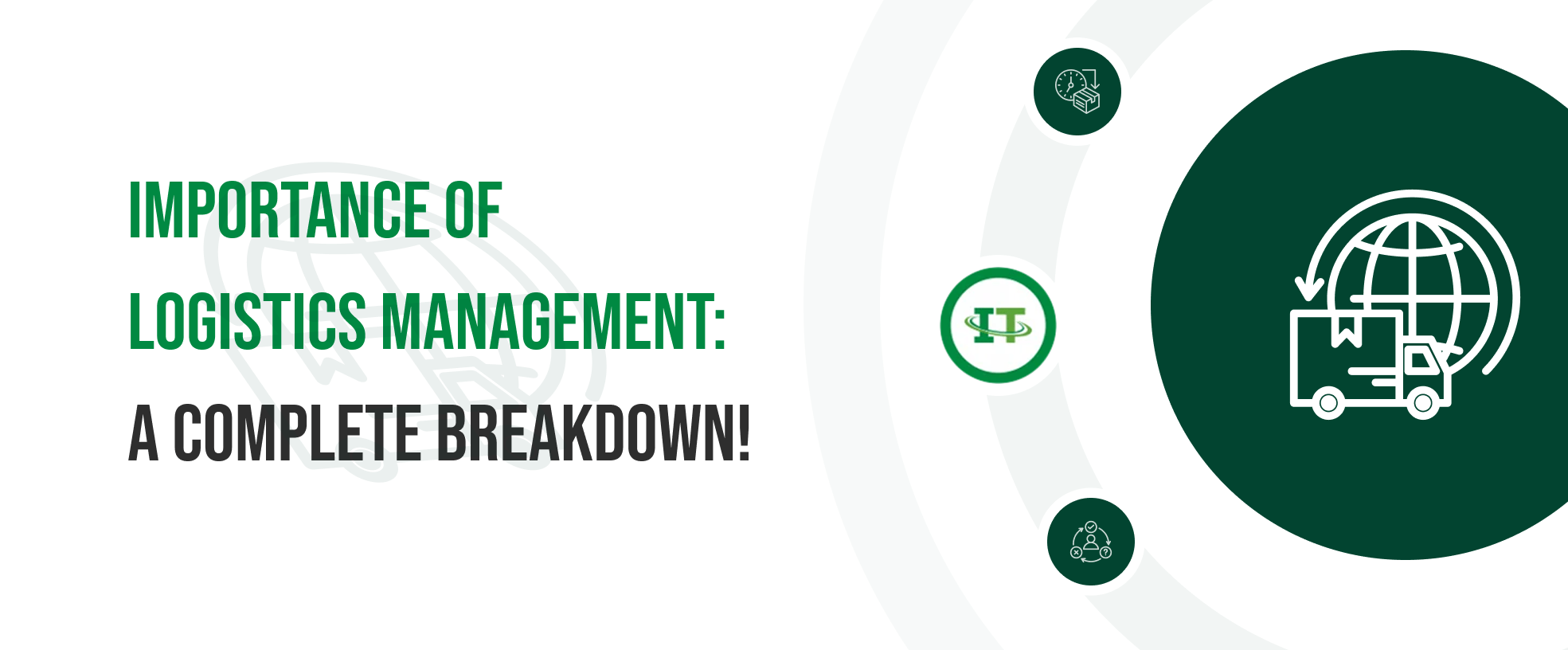What is The Importance of Logistics Management?

Logistics is not just moving goods ahead; it is more about moving your business ahead.
Logistics Management lies at the heart of smooth and hassle-free business operations. It ensures that supplies reach customers on time and aims to make the process utterly safe plus efficient. It also helps them save enormous costs. Want to know the importance of logistics management in detail?
What Will We Cover?
- What is Logistics Management?
- Why is Logistics Management Important?
- 1. On-Time Delivery & Customer Satisfaction
- 2. Decreases Operational Costs
- 3. Improves Efficiency of Supply Chain
- 4. Facilitates Global Trade
- 5. Accelerates Business Growth
- 6. Gives A Competitive Edge
- 7. Better Decision Making
- 8. Better Risk Management
Whether you are a logistics company or supply chain expert, understanding the importance of logistics management can help you succeed in the long run.
What is Logistics Management?
Logistics management refers to the planning, coordinating, and overseeing of the movement of goods, services, and information from the point of origin to the final consumer. It plays a vital role in procurement, warehousing, inventory management, transportation, and the final delivery of products.
Efficient logistics management helps reduce operational costs, improve customer satisfaction, and enhance the overall performance of supply chains.
Did you know? As per the report by Contimod[1], The global logistics market was valued at $8.96 trillion in 2023 and is expected to grow to 15.79 trillion by 2028.
Let us now know why logistics management is becoming important.
Why is Logistics Management Important?
Logistics management is important not only because it is an integral part of managing supply chain operations but also because it is a key to unlocking efficiency and better productivity in these operations.
1. On-Time Delivery & Customer Satisfaction
Effective logistics management guarantees that products are delivered on time and in good condition. In today’s customer-centric market, fast and reliable delivery is more necessary. Delays, damages, or misdeliveries can harm a company’s reputation and reduce customer loyalty.
By optimizing transportation routes, inventory availability, and delivery processes, logistics management helps build and maintain strong customer relationships.
2. Decreases Operational Costs
With proper logistics strategies in place, businesses can significantly cut unnecessary costs. This includes optimizing shipping routes, reducing warehouse storage costs, minimizing stockouts or overstocking, and avoiding delays.
Efficient logistics management leverages data and analytics to streamline supply chain operations, lowering procurement, storage, and distribution expenses.
3. Improves Efficiency of Supply Chain
Logistics is the flesh and blood of the supply chain, linking different stages like procurement, transportation, inventory, and distribution.
An effectively managed logistics runs without hassles and with the minimum possible disruptions. This increases responsiveness to changing market needs and infuses efficiency, performance, and agility.
4. Facilitates Global Trade
Another notable importance of logistics management is its involvement in global trade. With its help, you can easily navigate any complexities related to international shipping. This includes documentation, adherence to regulatory compliance, and much more.
With good logistics management software, businesses can expand into new horizons and scale their operations locally and internationally to ensure the cost-effective and timely delivery of supplies across borders.
This increases customer satisfaction and helps you gain an edge in the competitive marketplace. When businesses leverage the global markets, they have a sure-shot advantage over others.
5. Accelerates Business Growth
Companies’ logistics needs grow with them. A strong logistics management system always ensures that it grows with businesses’ needs and can handle a large amount without compromising efficiency. Logistics management is important because of its scalability factor. These systems are flexible, can be integrated with the enterprise tools, and can manage several warehouses simultaneously.
With the right logistics management, companies can achieve high efficiency, reduce hassles, and eliminate bottlenecks. They can also manage many supplies and customers without sacrificing quality. Hence, logistics management is suitable for businesses with a long-term expansion plan.
Did you know? According to Contimod[2], By 2035, AI will increase the logistics productivity by over 40%.
6. Gives A Competitive Edge
Companies that deliver with precision, speed, and lower cost remain a step ahead. Strategic logistics management is crucial for them. Businesses that can master logistics and adapt quickly to disruptions have an edge. They can adjust to the rising customers’ demands and give your business a clear-cut edge over the competitors.
Customers’ demand for faster delivery and real-time tracking has risen recently. Businesses investing in products like logistics management software can easily enter new markets, operate with high efficiency, and remain a step ahead.
7. Better Decision Making
Modern logistics management incorporates advanced technologies like warehouse management systems, GPS tracking, predictive analytics, and more. These tools allow you to gain real-time insights into your stock levels, track shipment status, and prevent potential delays.
When managers have precise data, they can make better, faster, and wiser decisions. This helps them build long-term strategies and make real-time data-based decisions, leading to better predictive analytics.
8. Better Risk Management
Logistics is a chain of several operational activities. Supply chain bottlenecks or transportation issues can also adversely impact business operations. A strong logistics management system has a contingency planning and real-time tracking feature that can enable businesses to be well-equipped with a contingency plan.
By now, it is clear why logistics management is essential. It helps with efficiency, leads to happy customers, and builds brand image.
Wrapping Up
Logistics management is like an unsung hero behind successful logistics operations. It manages all the activities from when the products enter the supply chain until they reach the customers. Effective logistics management enhances efficiency, drives productivity, and helps you save costs.
Key Takeaways
- Logistics management means coordinating goods, information, data, etc., along the supply chain.
- It plays a vital role in the procurement, transportation, storage, and delivery.
- It is the lifeline of the supply chain and keeps it running smoothly.
- Adopting logistics management helps the business have an edge.
- An efficient logistics boosts customer satisfaction rate and drives profitability.
- Integrating technology like logistics management software is a way to get the maximum benefits of logistics management.
Frequently Asked Questions (FAQs)
Got questions in mind? Here are the basic solutions to frequently asked questions:
1. What is the scope and importance of Logistics Management?
Logistics management covers various activities from when products enter the warehouse until they leave. It includes warehousing storage, inventory control, transportation, demand forecasting, and other activities that can help you achieve better operational efficiency.
2. What are the different types of Logistics?
Logistics is broadly categorized into inbound, outbound, reverse, and third-party. Each type of logistics has a distinct role in the supply chain.
3. What is the role of Logistics software in Logistics Management?
In logistics management, a logistics management software automates key operations, such as tracking inventory, routes, and warehouse management, to improve accuracy and reduce costs.
4. What are the key functions of Logistics Management?
Core functions of logistics management include storage and distribution, transportation, inventory control, demand forecasting, and successful order fulfillment. However, the key logistics management functions are not confined to these alone. Logistics management controls all the activities, from when supplies enter the market until they reach the end customers.
5. What are the best practices for effective logistics management?
The following best practices can be adopted for a better-running, and effective logistics management:
- Using the data-driven insights
- Implementing technology and automation tools
- Maintaining a strong relationship with the suppliers
- Optimizing the inventory levels
- Continuously monitoring performance
Choose iCommuneTech For Better Productivity & Cost Savings!
At iCommuneTech, we provide custom logistics software solutions that streamline your supply chain, enhance efficiency, and drive growth through advanced technologies and tailored strategies.
Book a free consultation today and share your ideas with us, we’ll bring your ideas to life!
Irshad Pathan

Web Development Expert
Irshad is a senior technical expert at iCommuneTech. He manages the iCommuneTech's Web Development Team, and has hands-on expertise in web development, Laravel development, Logistics, fleet management, and Supply Chain Management. He mentors the in-house team and enjoys describing his experience in words.
